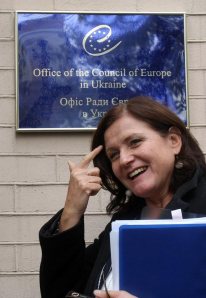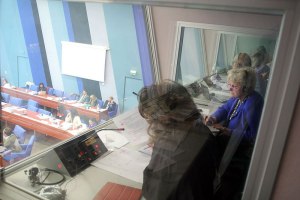Raising your voice to decision-makers
This is a blog post inspired by the civil conflict in Ukraine. However, it does not examine the causes of the unrest or attempt to lay blame with one side or the other. As people living outside of Ukraine, we may feel powerless as we follow the news trickling out of that region. We may not know how to decide who was right and so turn our backs, fearing having to choose one interpretation of a complex situation that we understand only poorly. But we do each have a responsibility: we are part of the same association of European countries as both Ukraine and the Russian Federation. We share also a common globalised market and quite a few elements of our culture.
The rules of the club
One possible avenue of response to the tensions in Ukraine, are sanctions. These are a non-violent method of showing disfavour, of trying to push parties from stand-offs to the negotiating table. Several dozen Russians have been sanctioned by the EU with visa embargoes (and some international political leaders by the Donetsk People’s Republic). Economic sanctions – including freezing of the assets of the individuals and corporations targeted – are also a common response. (The tangled ties of the global economy in this conflict will be discussed in a related blog.)
But we also have other means of trying to pressure another country to change its strategy. The Russian Federation is not following the rules to which it agreed by joining the Council of Europe (CoE). What should the other 46 Member States in the CoE do? Exclusion of Member States who don’t follow the rules of the CoE is always an option. However, if we still agree with the fundamental assumption that cooperation is better than war, the real question is: how can recalcitrant Member States be brought to the same standard. The Council of Europe does this through monitoring its Member States, including reviewing the changes implemented following judgments at the European Court of Human Rights. And it is not only Russia which does not get full marks from the monitoring: governments of other countries are diverging from the ‘club rules’ as well. In the UK, for example, anger at recent judgements against the UK of theEuropean Court of Human Rights (ECHR) has led to calls in the domestic arena to leave the Council of Europe.
These might seem to be remote institutions, but they are made up of people representing the people of each Member State. And it may seem that the issues are impossibly complex, but in fact the issues are often straightforward, although the implementation of the solution might be technically complicated. Specialists can help design the solution, but it is up to us to call on our political representatives to help create a world which respects the human rights of all.
Monitoring
The effectiveness and continued relevance of the Council of Europe, like any voluntary club, hinges on its members honouring the commitments they have made. The Council of Europe’s Secretary General called on Member States to honour their commitments in his recent report on the state of human rights, democracy, and the rule of law in Europe: “In order to prevent a recurrence of new crises, all member States must fully and unequivocally re-commit themselves to the European Convention on Human Rights and other core conventions of our Organisation”. He also highlighted that monitoring can be difficult, due to lack of agreement on what to monitor, overlapping work areas between the various monitoring organisations, or sometimes, lack of adequate implementation.
What are the problems that are spotted through monitoring? Problems that are universal but may be more hidden than overt in some European countries: corruption; restraints on media freedom; lack of complete and functioning systems of democratic checks and balances between parts of the government; and judicial systems that lack independence. One of the objectives of having a voluntary international association such as the Council of Europe, is that countries commit to a fundamental orientation, of respecting human rights, and also to moving steadily along a route of improving how this ideal is turned into practice.
And we citizens of other CoE Member States, citizens of Ireland, the Netherlands, the UK, Germany, and other countries, if we believe in living or making real the values enshrined in treaties such as the European Convention on Human Rights, we must call on our own governments make sure we as well as others, do as we say. The Council of Europe is not a remote institution making pronouncements on its own bat. Forty-seven countries are directly represented in theCommittee of Ministers of the CoE and also via the national parliamentarians who come together four times a year in the Parliamentary Assembly. The need to honour human rights is as relevant ‘at home’ as it is in areas of overt tension. We must demand of our elected representative that they honour their Council of Europe Member State commitments.
2014: European Parliament elections
For some, discontent about another (separate) voluntary club is being expressed in the rise of nationalismand, often related Euroscepticism, which may alter the composition of the European Parliament after the elections next week. It is essential that everyone who is registered votes in the upcoming European Parliament elections, as the best parliament is one which reflects the views of all the citizens, not just those who feel strongly motivated at the time of the elections. And then, once your MEPs are elected, make sure they know what you think: they represent you. And so do your national ministers: they gather and make decisions in the European Council (Heads of State of European Union Member States), so go ahead and tell your national ministers about the importance of human rights and peace.
We as individuals might feel anxious or powerless with regard to Ukraine and Russia, but in fact, each of us has a voice. Your candidates for the European Parliament, your national parliamentarians, and your national ministers are all involved in the governance of the European ‘clubs’ promoting peace and human rights. They will only hear your voice if you speak out loud –through your vote and through your letters and e-mails to them – to tell them the importance of these values.
**
Further reading: The Council of Europe Secretary General’s report



Leave a Reply